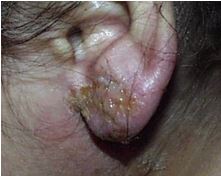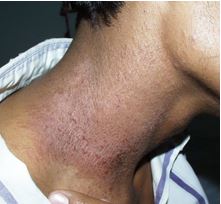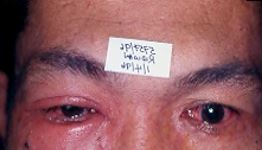Allergic contact dermatitis is a type of exogenous dermatitis or eczema. This is an itchy skin condition which occurrs when the skin is in contact with a specific allergen and the skin develops an allergic reaction to the allergen. The skin will be inflamed with varying degrees of redness, swelling and blisters. It is not an infectious disease or life-threatening but can be very uncomfortable with severe itchiness. Common allergens include nickel, perfume, cosmetics, hair dyes and plants. Some allergens may cause an allergic reaction when exposed to sunlight after application of the potential allergen. This is called photo contact dermatitis. Common offenders in sunscreens are e.g. oxybenzone and cinnamates.
Allergic contact dermatitis is different from irritant contact dermatitis, in which a similar skin reaction occurs but it is due to excessive contact with irritants with damaging effect to the skin. Examples of common irritants are water, soaps, detergents, solvents, acids and alkalis. Irritant contact dermatitis may affect anyone, providing they have had enough exposure to the irritant, especially those with defective barrier function e.g. atopic eczema individuals. Irritant contact dermatitis is much more common than allergic contact dermatitis.
Signs and Symptoms
These include red inflamed itchy skin or red bumps, blisters, crusting, cracking and weepiness. Clinically, the eczema occurs at the site of contact with the allergen but in severe cases secondary spread may occur and eventually may cause generalization involving various part of the body even at areas of no contact.
Below are some examples of allergic contact dermatitis:
 |
Ear lobe eczema due to allergic contact dermatitis to ear ring containing nickel |
 |
Eczema of the neck due to allergic contact dermatitis to perfume |
 |
Red itchy eyes due to allergic reaction to chloramphenicol eye ointment |
Complications
- Due to cracking of the skin, bacteria or fungal may cause infection of the skin.
- Chronic scratching may become habitual resulting in thick, leathery and hyperpigmented skin. This is known as neurodermatitis or lichen simplex chronicus
Investigations
- To diagnose contact dermatitis sometimes may not require any specific test. A good history is essential which includes both occupational and domestic exposure to allergens. Allergic contact dermatitis is suspected when there is obvious contact with an allergen and the eczema gets better when the patient is not exposed temporarily or no longer in contact with the skin. The eczema is asymmetrical or linear in pattern and occurs in areas such as the eyelids, ears, hands and feet, or perianal skin.
- To find the allergen causing the eczema, patch test may be carried out by a dermatologist. This test consists of applying small quantities of potential allergens onto your back and remains on your skin for 2 days before the doctor evaluates the response.
Treatment
- Avoid the allergen. Once the allergen is identified from the patch test, the doctor will try to identify the exposure to the offending allergen and will advise you on how to avoid the allergen.
- For the treatment of acute eczema, soak with saline or potassium permanganate and then apply the prescribed topical corticosteroids.
- In chronic cases, treatment usually consists of moisturisers and topical corticosteroids.
- In severe cases, oral steroids may be required. If bacterial infection is suspected, a course of systemic antibiotics may also be prescribed.
Prevention
- There is a need to understand your environment to avoid exposure to the allergen
- Use protective gloves when carrying out household tasks
- Use moisturiser frequently to improve the barrier function of the skin
| Last Reviewed | : | 23 August 2019 |
| Writer | : | Dr. Noor Zalmy Azizah bt. Mohd Ali Azizan |
| Accreditor | : | Datin Dr. Asmah bt. Johar |
| Reviewer | : | Dr. Nazatul Shima bt. Abd Rahim |







